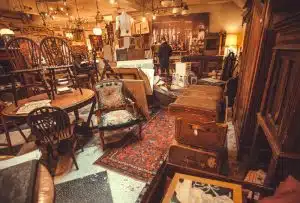 Antique dealers in the UK face a variety of legal issues, including those related to the sale of counterfeit or stolen goods, compliance with consumer protection laws, and proper labeling and disclosure of items for sale.
Antique dealers in the UK face a variety of legal issues, including those related to the sale of counterfeit or stolen goods, compliance with consumer protection laws, and proper labeling and disclosure of items for sale.
Additionally, antique dealers must navigate complex import and export regulations, as well as laws governing the sale of culturally significant or protected items. It is important for antique dealers to stay informed of these legal requirements and seek the advice of a lawyer if they have any questions or concerns
What licences does an antiques dealer need?
A second-hand dealer, including an antique dealer, must obtain a licence or registration from the Scottish local authorities before they can begin operation. Various local authorities in the UK license or register second-hand businesses where it is not just incidental but is an integral part of the business, although certain specific exemptions generally apply (for example, jewellers).
It is also normal for businesses that hold consumer credit authorisations to be exempt.
Consult your local authority’s trading standards department if you are unsure whether second-hand dealer licensing applies to your business.
For cultural objects that are to be exported from the UK over a certain age and value limit, an export licence must be obtained. Please contact the Export Licensing Unit at the Arts Council for more information. Visit the Arts Council website for information and to download publications for exporters.
Cultural Property Advice on the Collections Trust website also provides useful information about export licensing.
For any single transaction, dealers who make payments or accept cash equivalent to 10,000 euros are subject to the Money Laundering Regulations. HMRC requires that you register and implement anti-money laundering measures if you handle transactions of this size.
You will need a CITES (Convention on International Trade in Endangered Species of Wild Fauna and Flora) licence if you want to import or export certain restricted goods made from endangered plants or animals. The Gov.uk website has information on CITES licences.
Additionally, antique and historic firearms and weapons are subject to licensing requirements. Information about antique firearms can be found on Gov.uk, which is the website of the Home Office.
Read more: What trends are antique dealers seeing
Dealing in antiques
Any object that has been obtained illegally may be deemed ‘tainted’ under the Dealing in Cultural Objects (Offences) Act. In order to avoid this type of contamination, dealers are expected to take the appropriate steps. If you receive and sell stolen goods, pass off items fraudulently, and so on, you will be subject to criminal law. On the website of the Collections Trust, you can find more information.
Dealing in fine art
The law of droit de suite, also known as an artist’s resale right, is a legal requirement in the United Kingdom that imposes a levy on certain fine art transactions. The purpose of this law is to provide a financial benefit to artists, or their heirs, when their works are resold on the secondary market. Under this law, a collecting society is responsible for collecting and distributing the levy to eligible artists.
The law applies to original works of art, such as paintings, sculptures, and drawings, and the levy is calculated as a percentage of the sale price. The percentage is generally small, usually around 4%. It is important for sellers of fine art to be aware of their obligations under the droit de suite law, and to comply with the requirements of the collecting society in order to avoid penalties.
Selling general insurance
Financial Conduct Authority (FCA) regulation may apply to anyone selling, advising on, arranging or assisting in selling general insurance, even if it is only a small part of their business. FCA-regulated businesses or those appointed by FCA-regulated insurers are required to adhere to this legislation. You can find more information about the FCA on its website.
Money laundering
In any single transaction, high value dealers, including antique dealers, must comply with the Money Laundering Regulations. This size of transaction requires registering with HM Revenue & Customs (HMRC) and putting in place anti-money laundering measures.
Retailing
To protect the interests of consumers, retailers are subject to a wide range of legislation. There must be a clear indication of the retail price of goods, for instance, and goods must not be described in a misleading manner. Fair and honest treatment of customers is essential. Businesses that sell goods online are subject to special distance selling rules.
In addition to ensuring that all goods are of satisfactory quality, you will be responsible for making sure they are fit for the intended purpose. It is especially important to be careful when selling used electrical items like antique lights, which must be safe for use. In accordance with Trading Standards:
“If you sell second-hand electrical goods which are unsafe or incorrectly labelled, and you haven’t takenreasonable precautions to avoid this, you may be prosecuted. Taking reasonable precautions means you must take positive steps to ensure that you comply with the law. This will mean, in most cases, having the goods checked by a qualified electrician.”
Contact your local Trading Standards department for more information about consumer protection legislation. The Trading Standards Business Companion website has detailed information on your legal obligations to consumers, as well as the requirements when selling online. Gov.uk also provides useful information.
Disposal of waste and control of substances hazardous to health (COSHH)
You may be using substances like paint strippers, glue, varnishes, etc., that are hazardous to health if you perform processes on the premises, such as stripping furniture. These substances must be used, stored and disposed of in accordance with regulations. The Health and Safety Executive (HSE) provides information about protecting yourself, your workers and others.
A comprehensive list of hazardous and other waste disposal options can be found at Gov.uk.
Health & Safety, fire
Health and safety regulations at work and fire safety regulations must be followed.
Employment legislation
Employment legislation must be followed by anyone who employs employees. Among the most importantareas of employment law are recruitment, employment contracts, pay, working hours, holidays, employment policies, sick leave, maternity leave, paternity leave, discrimination, discipline, grievances, dismissals, and redundancies.
Insurance for an antiques dealer
Explain exactly how your business will operate, and your insurer will explain what insurance coverage you must have by law, as well as any additional coverage you might want to consider. Examples include:
- Employer’s liability
- Public liability
- Premises, premises contents and stock, including accidental damage
- Goods in transit (on the way back from auction, going to trade fairs and so on)
- Goods in trust – for example items which you are selling on someone’s behalf, or which you are restoring
- Defective title
- Cash
- Business interruption
- Business motor insurance
In the event that you have something of particular value in stock, you may need to increase your insurance coverage from time to time.
Antiques trade insurers can be provided by BADA and LAPADA to their members.
As a full member of BAFRA, LAPADA members receive discounted insurance rates and access to favourable insurance terms.
Conclusion
In conclusion, antique dealers in the UK must navigate a complex web of legal requirements in order to operate their business legally and ethically. The main legal issues that antique dealers must overcome include the sale of counterfeit or stolen goods, compliance with consumer protection laws, proper labeling and disclosure of items for sale, compliance with import and export regulations, and the sale of culturally significant or protected items.
Additionally, they must comply with the artist resale right law, known as the law of droit de suite, which requires certain fine art transactions to pay a levy to a collecting society. Antique dealers must stay informed of these legal requirements and seek the advice of a lawyer if they have any questions or concerns. Failure to comply with these laws can result in penalties, fines, and even criminal charges.
Thus, it is important for antique dealers to be aware of these legal issues and take steps to mitigate the risks of non-compliance.
Lee Jones is a seasoned Business Finance Specialist with over two decades of invaluable experience in the financial sector. With a keen eye for market trends and a passion for helping businesses thrive, Lee has become a trusted advisor to countless organizations seeking to navigate the complexities of finance.


